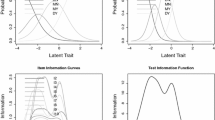Abstract
An investigation is reported which tests the applicability of two American instruments designed to assess tertiary students' evaluations of teaching effectiveness with 158 Nigerian undergraduates. The scales were found to have generally high internal consistency reliability coefficients, most of the items were seen to be appropriate, and every item was considered of importance by at least some of the students. In addition, all but the Workload/Difficulty items clearly differentiated between ‘good’ and ‘poor’ lecturers. Factor analysis found a strong main factor of teaching effectiveness plus a minor factor referring to course workload and difficulty. Further analysis generally supported the convergent and discriminant validity of those scales hypothesized to measure similar or dissimilar components of effective teaching. However, this analysis supported the factor analytic results as more overlap between aspects of teaching skill and enthusiasm was found than has been evident in Western studies. Thus there must be doubt about the cross-cultural validity of a multidimensional model of teaching effectiveness.
Similar content being viewed by others
References
Adesola, A.O. (1991). ‘The Nigerian university system: meeting the challenges of growth in a depressed economy.’ Higher Education, 21, 121–133.
Campbell, D.T., and Fiske, D.W. (1959). ‘Convergent and discriminant validation by the multitraitmultimethod matrix.’ Psychological Bulletin, 56, 81–105.
Clarkson, P.C. (1984). ‘Papua New Guinea students' perceptions of mathematics lecturers.’ Journal of Educational Psychology, 76, 1386–1395.
Cohen, P.A. (1981). ‘Student ratings of instruction and student achievement: A metaanalysis of multisection validity studies.’ Review of Educational Research, 51, 281–309.
Dunkin, M., and Barnes, J. (1986). ‘Research on teaching in higher education’. In Wittrock, M.C. (Ed.), Handbook of Research on Teaching, Third Edition: New York: MacMillan.
Frey, P.W. (1973). ‘Student ratings of teaching: Validity of several rating factors.’ Science, 182, 83–85.
Frey, P.W. (1978). ‘A two-dimensional analysis of student ratings of instruction.’ Research in Higher Education, 9, 69–91.
Frey, P.W. (1982). ‘Components of teaching’. Instructional Evaluation, 7, 3–10.
Frey, P.W., Leonard, D.W. and Beatty, W.W. (1975). ‘Student ratings of instruction: Validation research.’ American Educational Research Journal, 12, 327–336.
Hull, C.H., and Nie, H.H. (1984). SPSS-X. New York: McGraw Hill.
Marsh, H.W. (1977). ‘The validity of students' evaluations: Classroom evaluations of instructors independently nominated as best and worst teachers by graduating seniors.’ American Educational Research Journal, 14, 441–447.
Marsh, H.W. (1981a). ‘Students' evaluations of tertiary instruction: Testing the applicability of American surveys in an Australian setting.’ Australian Journal of Education, 25, 177–192.
Marsh, H.W. (1981b). ‘The use of path analysis to estimate teacher and course effects in student ratings of instructional effectiveness.’ Applied Psychological Measurement, 6, 47–60.
Marsh, H.W. (1982a). ‘SEEQ: A reliable, valid, and useful instrument for collecting students' evaluations of university teaching.’ British Journal of Educational Psychology, 52, 77–95.
Marsh, H.W. (1982b). ‘Validity of students' evaluations of college teaching: A multitrait-multimethod analysis.’ Journal of Educational Psychology, 74, 264–279.
Marsh, H.W. (1983). ‘Multidimensional ratings of teaching effectiveness by students from different academic settings and their relation to student/course/instructor characteristics.’ Journal of Educational Psychology, 75, 150–166.
Marsh, H.W. (1984). ‘Students' evaluations of university teaching: Dimensionality, reliability, validity, potential biases, and utility.’ Journal of Educational Psychology, 76, 707–754.
Marsh, H.W. (1987). ‘Students' evaluations of university teaching: Research findings, methodological issues, and directions for future research.’ International Journal of Educational Research, 11, 253–388.
Marsh, H.W., Fleiner, H., and Thomas, C.S. (1975). ‘Validity and usefulness of student evaluations of instructional quality.’ Journal of Educational Psychology, 67, 833–839.
Marsh, H.W., and Hocevar, D. (1983). ‘Confirmatory factor analysis of multitrait-multimethod matrices.’ Journal of Educational Measurement, 20, 231–248.
Marsh, H.W., and Overall, J.U. (1980). ‘Validity of students' evaluations of teaching effectiveness: Cognitive and affective criteria.’ Journal of Educational Psychology, 72, 468–475.
Marsh, H.W., Overall, J.U., and Kesler, S.P. (1979). ‘Validity of student evaluations of instructional effectiveness: A comparison of faculty self-evaluations and evaluations by their students.’ Journal of Educational Psychology, 71, 149–160.
Marsh, H.W., and Roche, L.A. (1991). ‘The use of student evaluations of university teaching in different settings: The applicability paradigm.’ As yet unpublished manuscript, University of Western Sydney.
Marsh, H.W., Touron, J., and Wheeler, B. (1985). ‘Student evaluations of university instructors: The applicability of American instruments in a Spanish setting.’ Teaching and Teacher Education, 1, 123–138.
Murray, H.G. (1980). A Comprehensive Plan for the Evaluation of Teaching at the University of Queensland. Brisbane: University of Queensland.
Overall, J.U., and Marsh, H.W. (1980). ‘Students' evaluations of instruction: A longitudinal study of their stability.’ Journal of Educational Psychology, 72, 321–325.
Watkins, D., Marsh, H., and Young, D. (1987). ‘Evaluating tertiary teaching: A New Zealand perspective.’ Teaching and Teacher Education, 2, 41–53.
Watkins, D., and Thomas, B. (1991). ‘Assessing teaching effectiveness: An Indian perspective.’ Assessment and Evaluation in Higher Education, 16, 185–198.
Author information
Authors and Affiliations
Rights and permissions
About this article
Cite this article
Watkins, D., Akande, A. Student evaluations of teaching effectiveness: a Nigerian investigation. High Educ 24, 453–463 (1992). https://doi.org/10.1007/BF00137242
Issue Date:
DOI: https://doi.org/10.1007/BF00137242



